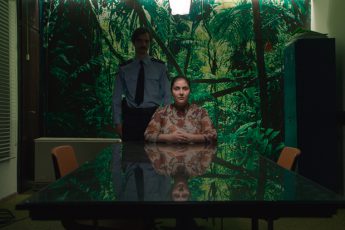Escaping Reality TV Through Apocalypse
Maria Saakyan’s Entropy (Entropiya, 2012)
Vol. 97 (September 2019) by Vadim Dumesh
Entropy is a 2012 experimental feature film by late Armenian director Maria Saakyan which watches over four filmmakers and a simpleton as they hold out in a deserted house anticipating a loosely defined apocalyptic event. Unlike the first two feature films of Saakyan which drew heavily on Armenian history and culture, Entropy is a child of Russian mass media and auteur cinema that instrumentalizes the biographies of its performers to achieve its aesthetic goals. The film is also deliberately disorderly and incoherent in its form, and a viewer not familiar with the Russian popular culture landscape would need to arm herself with minimal background knowledge in order to face Entropy. As Saakyan confessed herself, “European viewers will not understand our media personalities.”1
The most prominent of those featured in Entropy is @Xenia_Sobchak, a socialite, activist, and a quintessential modern Russian celebrity, a cross-over between Paris Hilton and Ivanka Trump, who plays (male) Producer Pasha. Pasha drives a successful indie director Valeria Gai Germanika (playing an outré goth director Gera Dark), freak-model Danila Polyakov (conceptual director Ilya), and actress Diana Dell (Masha, an untalented and melancholic actress of unworldly beauty) to an unfinished but already abandoned house on the outskirts of the city. There they willingly participate in DSLR-filmed artistic convulsions by Ilya, in the meantime anticipating an abstract but imminent end of the world represented by the ticking of a digital clock that is projected onto a wall. Seeming to miss a plot, the film first appears as a kaleidoscope of debauchery, intoxication, endless brawls and cursing. Ilya’s pirouettes are mixed with views of the characters’ torment in the face of imminent death and horny advances, thus displaying the moral bankruptcy and decadence of this narrow sample of cultural intelligentsia.
At the time of the release reviewers were unequivocally confused by the stark contrast between this ranting release and Saakyan’s previous two feature works The Lighthouse and I Will Not Change My Name, both of which were poetic, personal, touching, and carefully threaded films, the kind of arthouse cinema Entropy set out to ridicule as pretentious and meaningless in the face of the absolute imbecility of the mass media landscape. Saakyan’s attempts to explain such a sharp shift with being “suddenly tired of endlessly introspecting” or realizing that “arthouse cinema could be poetic, but it is boring”2 appear unconvincing. Perhaps the main driving force behind the film were producer Yulia Mishkinene and scriptwriter Grigory Matyuhin. The line-up of Mishkinene’s production house Vita Activa alternates between “real” arthouse films and foul comedies with bleak commercial ambition, and Matyuhin is a former press-secretary for the Cine Fantom club, a pivotal institution in the Russian arthouse cinema that granted him a front-row seat for observing the cinema and cultural elite “when it is not watched by the press or the power, when it does not need to put forward populist or moral ideas.”3
Other confusion, or rather annoyance, comes from the stylistic eclicticity of Entropy, which mashes black comedy, satire, farce, parody, cinema in cinema, and apocalypse film. The participation of eccentric Russian artist and provocateur Andrey Bartenev as Entropy’s art director, invites comparisons with performance art. Indeed, the most coherent feature of the film is the intentional affinity between the tabloid-famous performers and their fictional on-screen personalities, leaving Sobchak, Gai Germanika, Bell, and Polyakov with no other choice than to display the cliché versions of their media selves. Satirizing real-life celebrity in the face of imminent death affiliates Entropy with such classic as La Grande Bouffe and recent Hollywood comedy This Is The End.4
But such readings of Entropy largely overlook the influence of wildly popular reality show Dom-2 on Entropy, despite the show being on air for almost a decade at the time of the film’s release in 2012. Interviews with Saakyan, her crew and cast hint at the fact that much of the construction of Entropy is owed to Dom-2. “Dom-2012” was the original working title of the film, much more trivial and less pretentious than “Entropy” (although Pasha does justify the title with an out-of-character yet accurate reference to Robert Smithson’s vision of entropy as movement “towards an all-encompassing sameness”5). Sobchak, playing a central role in the film, rose to nation-wide fame as the first host of that reality show, which was first launched in 2004 to become “the longest running and most popular show in the world”6. The format of Dom-2 has young adults hungry for fame cohabitate in a mansion where they have to form strictly heterosexual couples and maintain a relationship in order to avoid being eliminated and win the ultimate price – a house of their own. Entropy too takes place in an abandoned mansion and dwells on the immediate pre-occupation of characters with romantic and sexual (albeit superficial and impotent) connections to each other in view of a common threat.
Entropy heavily relies on tropes of reality TV: scenes are punctuated by solo on-camera confessions and commentary, and the filmmakers never shy away from wide static shots. The script and cinematography of the film, just as in the reality format, are based on two-dimensional, easily digestible characters who react only to extremely un-nuanced situations. This, in turn, eliminates any multiplicity of meanings, equates the surface to inner content, and thus makes the film operate mostly in tautologies.7 Indeed, the tautology of Entropy is further amplified by abundant insistence that it undertakes to shame and chastise Russian auteur cinema, force feeding the viewer with numerous proclamations like “arthouse cinema is shit!” or grotesque parodies of Ilya’s directorial pirouettes.
In the reality show context, the unnamed apocalyptic event can be read as an elimination from the media space and a relegation to the other side of the screen (to “regular life”), in which the performed character will no longer exist. Dreading such a fate, the vain media personalities spiral ever deeper into their inner emptiness, represented towards the end of the film through masturbation, suicide, blood, sperm and vomit, all at once. Only the character of local redneck Veggie (played by professional actor Evgeny Tsyganov) is rescued from this manic identity paranoia.
Veggie stumbles upon the mansion and by virtue of being a fictional character is the one “true to himself” and thus unaffected by the ongoing elitist Apocalypse. This short-sleeve fellow is immediately identified as representing the people able to stand up for themselves (“Noone will fuck the Russian folk”), and harboring deep disdain to the perversions of artistic lifestyle (“I would hack all of you, darn artists!”). Instead of ridicule and unmasking, Veggie is patronized for his naive and brute love for TV personality Masha. The VO of his unelaborate love confession to lifeless Masha mysteriously opens the film, both alluring to the broken relationship between the auteur and the masses, and reproducing the flat and uniform love language of Dom-2.8
The final shot of Veggie carrying his idol’s corpse is a direct reference to Lars von Trier’s Melancholia. This is the most subtle of many Apocalyptic references overcompensating for the DIY-nature of Entropy’s Apocalypse, which results in the absence of any real cultural or historical contextualization. The punk-folk pamphlet Apocalypse by Rodion Lubensky is sounded twice, the montage of TV footage (again) shows the real public lives of Sobchak, Gai Germanika, and Rodionov, and the silent 3-minute helicopter shot of the Presidential cortege reigning on the deserted streets of Moscow serves as a heavy-handed epilogue. But by summoning the privilege of being the generation that lives through the ultimate Apocalypse, claiming responsibility for the presumably dysfunctional relationship between auteur and simple folk, and failing to be the Lumieres of their nation, Entropy‘s makers betray the very arrogance and helplessness that they had set to call out in the first place.
While Dom-2 relies on the controlled elimination of its participants as a mechanism of rejuvenation, self-perpetuating its narrative of simplistic dualistic moral oppositions,9 the helplessness of Entropy’s self-circuited construction sounds the cry of inability of an auteur to act as an agent of change in a state-surveyed capitalistic media landscape. Much like in the current discourses surrounding climate change, the film resorts to a discourse of total annihilation in the absence of any conceivable means of reversing the depths of the crisis, but at the same time yearns for catastrophe as an occasion for rebirth and redemption. In Entropy Saakyan fears not the end of the world, but what would happen should the end of the world never come.
Fast forward 7 years and Dom-2 is still the longest-running Russian TV show, celebrating 15 years on air, launching independent spin-offs, and running an offline and online media ecosystem fueled by endless news streams from the reality show. The headlines on the Dom-2 portal range from “Win the breast of your dreams with plastic surgery!” to “The newlyweds swore their love to God”, all accessible in a single scroll. The viewers surveyed in 2019 confess that they still perceive watching Dom-2 either as a guilty pleasure or as total immersion.10 Anecdotal evidence from a Russian arts student in Paris suggests her high school teacher encouraged viewership of Dom-2 as a way to learn about relationships. While the marriage between the church and the state has recently led to some popular backlash,11 mass media and celebrity remain the most efficient ways of communicating values. The cortege is still headed to the Kremlin, not a mausoleum, and Xenia Sobchak culminates her media career by making a much publicized run in the 2018 presidential election.12 The Apocalypse never came, and in this simple forecast Entropy is actually prophetic.




Leave a Comment